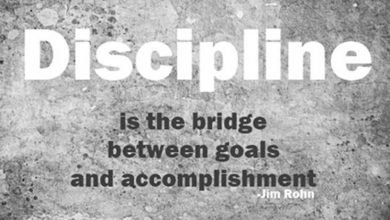
For many, 2020 has been a year of upheaval and continuous change, two issues that should not disappear soon. No single aspect of society has been spared from recent events, and business is no different. Being a great entrepreneur isn’t just about making money when the weather is beautiful. Great thrive in difficult times, but this does not facilitate difficult times. If you hope to learn how to resist the storm, it is always useful to gather other perspectives. No book can tell you the secret to getting your business out of uncertainty, but here are eleven that can help you.

1 Be the Go-To: How to Own Your Competitive Market, Charge More, and Have
In times of uncertainty, consumers stop taking risks and instead turn to the classic “go-to” brands, but how can they get these brands in the first place? Be the Go-To is a profound immersion in the way in which various companies have become indispensable brands in the past and what companies in today’s evolving market must do to achieve this same status.

2 Healing Hacks: Bring Your Body Back to Nature
No matter how much entrepreneurs want to focus on their business, they are ultimately human. If entrepreneurs want to be able to face the challenges that their company can face, they must take care of themselves and their business. Healing Hacks is Ian Hart’s personal and professional success story, followed by an unexplained medical disaster – and the inspiring healing process that followed.

3 Change (the) Management: Why We as Leaders Must Change for the Change to Last
Too often, companies that urgently need to change focus on small things. If there is nothing wrong with an occasional readjustment, the only real solution is sometimes top-down restructuring. Change (the) Management brings the change conversation back to the leaders at the center of it all, focusing on how radical change can help companies through a variety of different issues.

4 How to Win Friends and Influence People by Dale Carnegie
This book is guaranteed to change your life forever. Not only will it teach you all the do’s and don’ts of social life, but it will also show you how to be a better entrepreneur. We all know that the digital age has made it more difficult to be influential outside the Internet, which is just as important as the influence of the web, but Dale Carnegie interrupts all the steps you need to take to make friends with everyone you meet. It teaches you the etiquette of how to outperform the competition or how to win over people who are narrow-minded or only not interested in your field. Every entrepreneur must read this book at least once a year; it is a classic in the business world!

5 The Master Identity Thief: Testimony and Solutions of an Expert Witness
Dartanyon A. Williams was only 23 when he created a multimillion-dollar criminal union – and shortly afterward, he was behind bars. The Master Identity Thief is Williams’ story of how he shifted his criminal capabilities to different goals, revealing harrowing truths about white-collar crime and corporate greed in the process.

6 The Psychology of Selling by Brian Tracy
Every entrepreneur knows that the key to an excellent business is a proper sales technique. Not only do you have to sell your product, but you also have to sell yourself and your idea. Having a great product does nothing if you don’t know how to approach the person and make you and the product fall in love. This book by Brian Tracy provides valuable information and strategies on how to increase sales by focusing on one thing: the person. Sometimes entrepreneurs forget the basics of selling and jump right away to get results but to get results. You need to know the basics. Brian Tracy analyzes those important points thoroughly.

7 Sacred Economics: Money, Gift, and Society in the Age of Transition
The sacred economy may not be focused on the vanguard of the business world, but this does not make its content less valuable. Charles Eisenstein tells how hunting and barter-based societies turned to capitalism and how those who thrived got where they are today. At a time when the economy appears to be in an endless transition to something new, it is helpful to look back on history to pave the way.

8 Average Sucks: Why You Don’t Get What You Want (and What to Do About It) by Michael Bernoff
Good entrepreneurship isn’t about strategy and networking – sometimes, it’s just about who you are. Michael Bernoff’s new book takes language away from most business guides to focus on the basics: what do you bring as an entrepreneur? It may be more challenging to find an answer to this question than you think, but Average Sucks will help you.

9 Banking on Digital Growth: The Strategic Marketing Manifesto to Transform Financial Brands
Over the years, the business world has become increasingly digital. But most traditional financial institutions such as banks and credit unions are still unprepared for the future. Exploiting digital growth is a practical guide to understanding the role of finance in the digital economy, and James Robert Lay’s ideas will be able to broaden the perspective of even the most stubborn traditionalists.

10 Darkness Visible: A Memoir of Madness
Just as entrepreneurs must take care of their health, they must pay the same attention to their mental state. The chronicle of the legendary novelist William Styron about his depression, Darkness Visible, is never easy to read, but always necessary. Styron’s willingness to expose his pain and vulnerability can show readers that coming to terms with his problems is the only way forward.

11 Rich Dad, Poor Dad by Robert T. Kiyosaki
This is the best personal finance book ever written. Tell the story of Kiyosaki and his two fathers, his birth father, and that of his best friend (his wealthy dad), as well as how the two men helped him shape his views on money and investment. Reject the myth that you have to earn high to get rich and distinguish between working for money and having money for you.

BIO
James is a learning specialist at a free essay writer; he designs and delivers learning initiatives (both in-class and online) for a global and internal audience. He is responsible for on-going development, delivery, and maintenance of training. He can manage competing priorities to execute time-sensitive deliverables within a changing environment. He contributes in continually improving the team’s processes and standards and works as a member of the team to assist with team initiatives.









